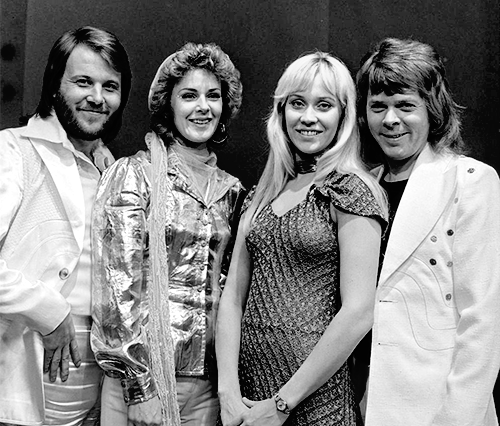
ABBA
ABBA (/ˈæbə/ AB-ə, Swedish: [ˈâbːa]; formerly named Björn & Benny, Agnetha & Anni-Frid or Björn & Benny, Agnetha & Frida) are a Swedish pop supergroup formed in Stockholm in 1972 by Agnetha Fältskog, Björn Ulvaeus, Benny Andersson, and Anni-Frid Lyngstad. The group's name is an acronym of the first letters of their first names arranged as a palindrome. They are one of the most popular and successful musical groups of all time,[3] and are one of the best-selling music acts in the history of popular music.
"Abba" redirects here. For other uses, see Abba (disambiguation).
ABBA
- Björn & Benny, Agnetha & Anni-Frid
- Björn & Benny, Agnetha & Frida
Stockholm, Sweden
- 1972–1982, 2016–present
In 1974, ABBA were Sweden's first winner of the Eurovision Song Contest with the song "Waterloo", which in 2005 was chosen as the best song in the competition's history as part of the 50th anniversary celebration of the contest.[4] During the band's main active years, it consisted of two married couples: Fältskog and Ulvaeus, and Lyngstad and Andersson. With the increase of their popularity, their personal lives suffered, which eventually resulted in the collapse of both marriages. The relationship changes were reflected in the group's music, with later songs featuring darker and more introspective lyrics.[5] After ABBA disbanded in December 1982, Andersson and Ulvaeus continued their success writing music for multiple audiences including stage, musicals and movies,[6][7] while Fältskog and Lyngstad pursued solo careers.[8][9] Ten years after the group broke up, a compilation, ABBA Gold, was released, becoming a worldwide best-seller. In 1999, ABBA's music was adapted into Mamma Mia!, a stage musical that toured worldwide and, as of April 2022, is still in the top-ten longest running productions on both Broadway (closed in 2015) and the West End (still running). A film of the same title, released in 2008, became the highest-grossing film in the United Kingdom that year. A sequel, Mamma Mia! Here We Go Again, was released in 2018.
ABBA are among the best-selling music artists in history, with record sales estimated to be between 150 million to 385 million sold worldwide[10][11] and the group were ranked 3rd best-selling singles artists in the United Kingdom with a total of 11.3 million singles sold by 3 November 2012.[12] In May 2023, ABBA were awarded the BRIT Billion Award which celebrates those who have surpassed the milestone of one billion UK streams in their career.[13] ABBA were the first group from a non-English-speaking country to achieve consistent success in the charts of English-speaking countries, including the United Kingdom, Australia, United States, Republic of Ireland, Canada, New Zealand and South Africa.[14] They are the best-selling Swedish band of all time[15] and the best-selling band originating in continental Europe. ABBA had eight consecutive number-one albums in the UK. The group also enjoyed significant success in Latin America and recorded a collection of their hit songs in Spanish. ABBA were inducted into the Vocal Group Hall of Fame in 2002.[16] The group were inducted into the Rock and Roll Hall of Fame in 2010, the first recording artists to receive this honour from outside an Anglophonic country.[17] In 2015, their song "Dancing Queen" was inducted into the Recording Academy's Grammy Hall of Fame.[18]
In 2016, the group reunited and started working on a digital avatar concert tour.[19] Newly recorded songs were announced in 2018.[20] Voyage, their first new album in 40 years, was released on 5 November 2021 to positive critical reviews and strong sales in numerous countries.[21] ABBA Voyage, a concert residency featuring ABBA as virtual avatars, opened in May 2022 in London.[22]
Artistry[edit]
Recording process[edit]
ABBA were perfectionists in the studio, working on tracks until they got them right rather than leaving them to come back to later on.[137] They spent the bulk of their time within the studio; in separate 2021 interviews Ulvaeus stated they may have toured for only 6 months[138] while Andersson said they played fewer than 100 shows during the band's career.[100] Although, counting shorter 30 to 60 minute concerts during their Folkpark tours, the group in fact played over 200 shows.[139]
The band created a basic rhythm track with a drummer, guitarist and bass player, and overlaid other arrangements and instruments. Vocals were then added, and orchestra overdubs were usually left until last.[137]
Fältskog and Lyngstad contributed ideas at the studio stage. Andersson and Ulvaeus played them the backing tracks and they made comments and suggestions. According to Fältskog, she and Lyngstad had the final say in how the lyrics were shaped.
The members of ABBA were married as follows: Agnetha Fältskog and Björn Ulvaeus from 1971 to 1979; Benny Andersson and Anni-Frid Lyngstad from 1978 to 1981.[151] For their subsequent marriages, see their articles.
In addition to the four members of ABBA, other musicians regularly played on their studio recordings, live appearances and concert performances. These include:[152][153][154]